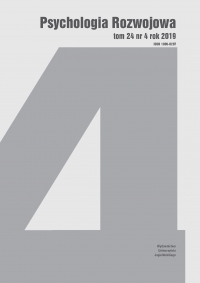Kwestionariusz Elastyczności w Radzeniu Sobie ze Stresem dla Adolescentów (KERS-14A)
Flexibility of Coping with Stress Questionnaire for Adolescents (FCSQ-14A)
Author(s): Izabela Grzankowska, Agnieszka Kruczek, Michalina Sołtys, Małgorzata A. BasińskaSubject(s): Educational Psychology, Social psychology and group interaction, Developmental Psychology, Clinical psychology, Substance abuse and addiction
Published by: Wydawnictwo Uniwersytetu Jagiellońskiego
Keywords: flexibility in coping; adolescents; measurement tool;
Summary/Abstract: Coping flexibility is one of the crucial traits determining individual adaptive ability, which is associated with precise adjustment to environmental requirements in a stressful situation. One of the elements that assist in this adjustment is coping flexibility which relies on finding a strategy appropriate for the particular circumstances in which it is to be applied. People who are flexible in coping are characterized by sensitivity to subtle signals coming from the environment, which allow them to change their behavior and act in a more adaptive way. Flexibility in coping has not yet been studied in the Western population of children and adolescents. Due to the lack of methods that could record all signs of flexibility, it was reasonable to start work on a questionnaire that would measure this construct. To provide an equivalent to the Flexibility of Coping with Stress Questionnaire (FCSQ-14) for adults, the Flexibility of Coping with Stress Questionnaire for Adolescents (FCSQ-14A) was developed. Based on the results of pilot studies, assessment of competent judges (CVR < .6), and exploratory factor analysis (EFA) a tool containing 14 items – which examines three dimensions of flexibility: a repertoire of coping strategies, coping competence, and reflexivity – was created. The psychometric properties of the final version of the questionnaire were verified in terms of reliability and validity on a group of adolescents (N = 288), ages 14 to 20 (M = 16.50, SD = 1.58), in accordance with validation standards. The results showed that FCQ-14A is a valid and reliable method: most values of Cronbach’s α coefficients exceed the value of .7, absolute stability is satisfactory, as is both the internal and external validity. The results of Confirmatory Factor Analysis (CFA) in a group of adolescents for a three-factor solution showed that the model is adjusted to the data on an acceptable level (RMSEA = .057; GFI = .94; AGFI = .92).
Journal: Psychologia Rozwojowa
- Issue Year: 24/2019
- Issue No: 4
- Page Range: 39-56
- Page Count: 18
- Language: Polish

